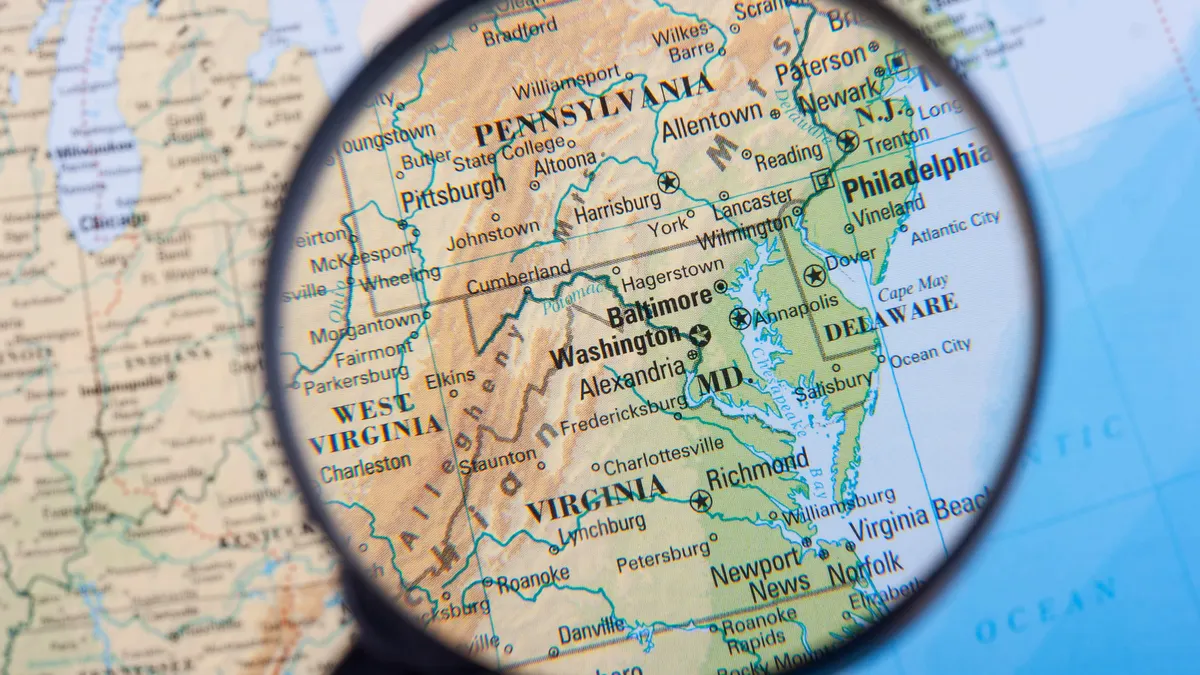Seattle was the first major U.S. market to see an impact from the coronavirus pandemic, and could be among the first to recover, as data suggests Washington state has successfully bent the curve on new cases.
For bankers in the market, the question now becomes how the Emerald City can get back to business as usual after the state's stay-at-home order ends May 4.
Banks in Seattle chose a wide spectrum of responses to the crisis in their retail operations ranging from shuttering branches to doing nothing at all.
Matt Deines, president and CEO of the $1.3 billion-asset First Federal in Port Angeles, Washington, told Banking Dive his bank probably fell somewhere in the middle — keeping all of its branches open, but closing the lobbies. Its customers have relied heavily on interactive teller machines and drive-thru lanes. It has also seen a significant uptick in the use of its mobile banking platforms, Deines said.
"And our call center has been slammed," he told Banking Dive.
First Federal will encourage — but not require — its staff to wear masks once the branches are fully functional again, Deines said, adding the bank will allow customers to wear masks, too.
"To think that you'd let someone walk into a bank wearing a mask is crazy, though," he said.
Panicked withdrawals
Laurie Stewart, president and CEO of the $720 million-asset Sound Community Bank, said banking and life in general will not approach "normal" in Seattle at least through the summer.
Stewart said Sound may return to typical retail operations toward the beginning of Seattle’s reopening process, but hours of operation may never be the same. The bank chose to limit hours at some branches rather than close them — particularly at locations without drive-thru windows.
"But it's definitely calmer in our branches than it was even a week or two ago," she said. "We have less of the panicked cash withdrawals."
A couple of the bank's branches had to double their cash orders at the onset of the coronavirus outbreak, Stewart said. "We had a couple of clients wanting $40,000 or $50,000," she said. "We tried everything to discourage them because we think that’s a horribly bad idea."
First Federal, too, saw a week where cash was in heavy demand, with some customers asking for as much as $20,000, Deines said.
"But I think people have come to realize that the safest place for their money is in their bank and not underneath their mattress," he said.
Gary Swindler, president and CEO of Washington State Employees Credit Union (WSECU) in Olympia, said the credit union experienced some large withdrawals in mid-March. To accommodate the demand, the credit union was forced to temporarily raise its cash limits.
"We certainly counseled many members not to do this, as we were staying open, we are financially strong and stable, and that their funds are insured," he said.
Neither Deines nor Stewart could give specific guidance on the year-over-year impact of the crisis — First Federal and Sound will both report first-quarter earnings next week. But Deines said deposits were higher.
"You just don't have chances to spend money like you normally would, whether that’s on coffee or lunch or dinner," he said.
Access to the PPP
Stewart said Sound has been inundated with requests for Paycheck Protection Program (PPP) loans. The bank approved $50 million in PPP loans thus far and helped save 3,000 jobs in the process, she said.
The Senate and the House this week passed a measure allocating an additional $320 billion for the PPP after the first round of $350 billion was quickly gobbled up.
Deines said he believes the new funds could be gone within 48 hours, adding the bank could have approved 10 times as many PPP loans as it did if the extra $320 billion was available in the first round.
Although the $3.3 billion-asset WSECU was not historically an SBA lender, the Small Business Administration (SBA) offered to give other established financial institutions the authority to process loans for its small-business members, Swindler said.
"Unfortunately, as we stood up our program, the government funding dried up," he said. "We have had hundreds of inquiries from members and dozens of small-business owners in contact to queue them up for the next level of funding."
The credit union had already seen a decline in auto lending before the coronavirus pandemic, and it decreased even further as the crisis took hold in March, Swindler said. At the same time, deposit balances continue to grow with members hunkering down.
As permitted activities gradually resume across the state, the credit union will begin to offer more services for members, Swindler said.
"But this is our new normal for the foreseeable future," he said.

















